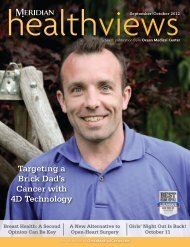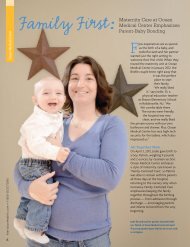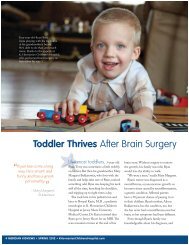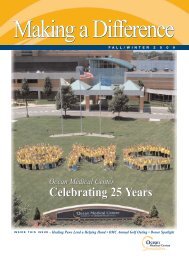page 8 - Ocean Medical Center
page 8 - Ocean Medical Center
page 8 - Ocean Medical Center
You also want an ePaper? Increase the reach of your titles
YUMPU automatically turns print PDFs into web optimized ePapers that Google loves.
that’s possible with smaller polyps. Day<br />
was one step away from cancer.<br />
She was immediately sent to get a<br />
CT scan and then met with her primary<br />
care physician, Rao Gourkanti, M.D. Dr.<br />
Gourkanti let her know that she would<br />
need surgery — a laparoscopic right<br />
colon resection. During this procedure,<br />
the section of the colon containing the<br />
lesion is removed and the bowel is put<br />
back together. “I asked him who would<br />
be the best doctor for this procedure,<br />
and his eyes lit up,” Day recalls.<br />
That’s because Dr. Gourkanti<br />
knew that Howard Ross, M.D.,<br />
chief of colon and rectal surgery at<br />
Riverview, would be perfect. Dr. Ross<br />
had recently hosted a symposium<br />
at Riverview for the nation’s leading<br />
laparoscopic colon and rectal<br />
surgeons. The group met to standardize<br />
and create a new single-incision<br />
laparoscopic colectomy technique.<br />
New Technique Leads to<br />
Fast Recovery<br />
Traditional laparoscopic colon resection<br />
surgery involves a surgeon operating<br />
in multiple sites within the abdomen,<br />
which requires multiple incisions.<br />
Under the guidance of Dr. Ross, a team<br />
of 12 specialists further developed the<br />
single-incision technique, in which all<br />
the work is accomplished through a<br />
single incision at the belly button that is<br />
smaller than 2 inches.<br />
“While this new technology is<br />
still in the early stages, patients<br />
undergoing single-incision colectomy<br />
surgery may have the benefit of fewer<br />
incisions, quicker healing time, and<br />
less discomfort,” explains Dr. Ross.<br />
The single-incision laparoscopic<br />
colectomy technique, pioneered in<br />
part at Riverview, will be taught to<br />
surgeons throughout the U.S. This<br />
work will eventually lead to a<br />
full research trial to demonstrate<br />
the benefits of the new surgery.<br />
Day was comforted knowing that<br />
she didn’t have to travel to New York<br />
or Philadelphia for the best care and<br />
says her four days of postoperative<br />
care at Riverview were exceptional.<br />
Six weeks after the surgery, Day<br />
received clearance to get back in the<br />
gym and since then has resumed her<br />
regular workout routine. Even more<br />
than getting back to her workouts,<br />
Day appreciated being able to play<br />
with her grandchildren again so soon<br />
after surgery.<br />
“If I had one piece of advice for<br />
anyone over the age of 50, it would<br />
be to listen to your loved ones around<br />
you and schedule a colonoscopy,” she<br />
says. “I finally did, and it saved my<br />
life.” • — Tom Paolella<br />
HV-RMC_IBD_7.375x2.75-10_Layout 1 1/7/10 10:18 AM Page 1<br />
Preventing Colon Cancer<br />
Colorectal cancer is the second most common cause<br />
of cancer deaths for men and women combined.<br />
When men and women are considered separately,<br />
colorectal cancer is the third most common cause of<br />
death in each sex, according to the American Cancer<br />
Society (ACS).<br />
Your risk of developing colorectal cancer increases<br />
with age, but other lifestyle factors and genetics also<br />
play a role in increasing risk. The risk for colorectal<br />
cancer increases after age 40 and rises sharply<br />
beginning around age 50, the National Cancer<br />
Institute (NCI) reports.<br />
Although experts don’t know the exact cause of<br />
most colorectal cancers, it is possible to prevent many<br />
of them. Regular colorectal cancer screening is one of<br />
the most powerful weapons for preventing colorectal<br />
cancer. This is because some polyps, or growths, can<br />
be found and removed before they have the chance<br />
to turn into cancer. Screening can also help find<br />
colorectal cancer early, when it is highly curable.<br />
Researchers say that diet appears to affect your<br />
risk of developing colorectal cancer. People whose<br />
diets are high in fat (especially fats from animal<br />
sources), protein, calories, alcohol, and meat are<br />
especially at risk.<br />
Obesity can increase the risk for colorectal<br />
cancer, and so can smoking, according to the ACS<br />
and the NCI. A sedentary lifestyle has also been<br />
linked to an increased risk. According to the ACS,<br />
getting at least 30 minutes of physical activity on<br />
five or more days of the week can lower the risk of<br />
getting colorectal cancer.<br />
The Crohn’s and Colitis Management <strong>Center</strong> at Riverview<br />
Our <strong>Center</strong> serves as a comprehensive site for patients with Crohn’s disease and ulcerative colitis.<br />
Here, a team of surgeons, enterostomal therapists, nurses, dietitians, radiologists, pathologists,<br />
pain management specialists, and gastroenterologists strives to collaborate seamlessly with your<br />
health care team to offer:<br />
• Laparoscopic and conventional surgery for ulcerative colitis and Crohn’s disease<br />
• Care of complex anorectal disease<br />
• Nutritional assessment and optimization<br />
• Consultations on pain medication and wound and stoma care<br />
• Second opinions and entry into research trials<br />
Taking Care of<br />
New Jersey<br />
For more information about the <strong>Center</strong>, please call<br />
1-800-DOCTORS® or visit Riverview<strong>Medical</strong><strong>Center</strong>.com/IBD














